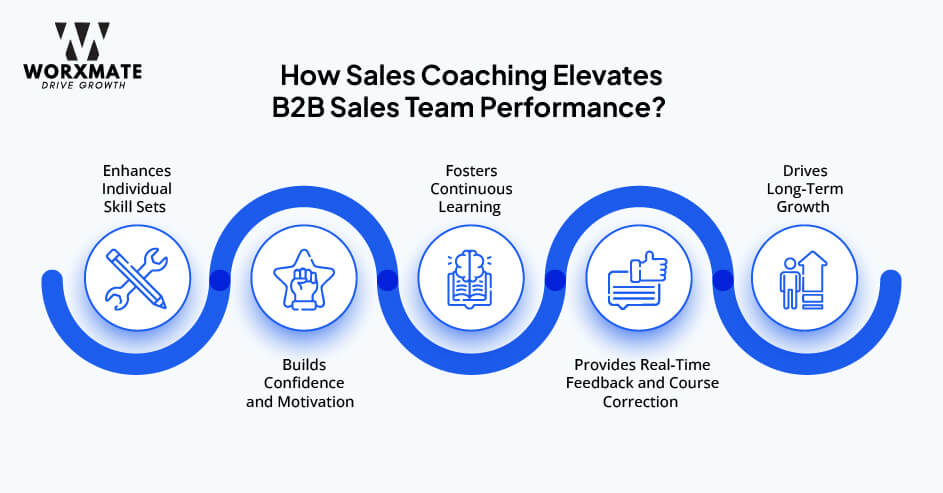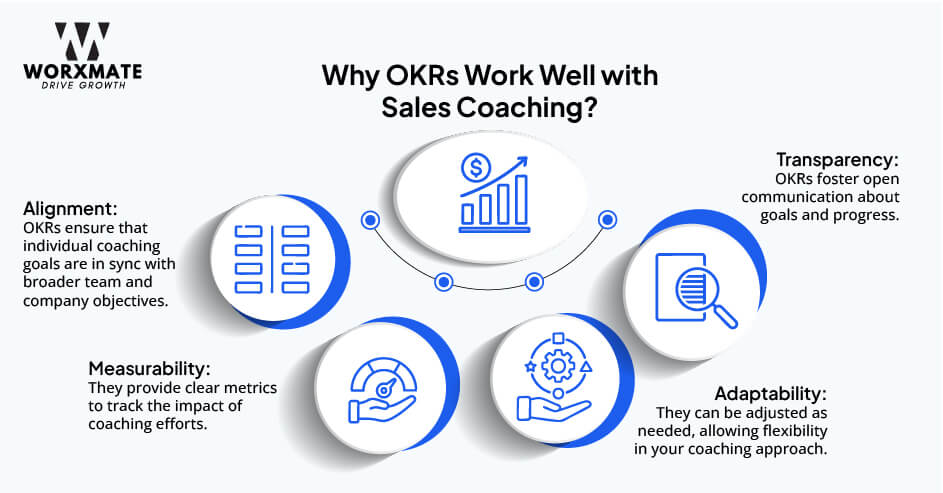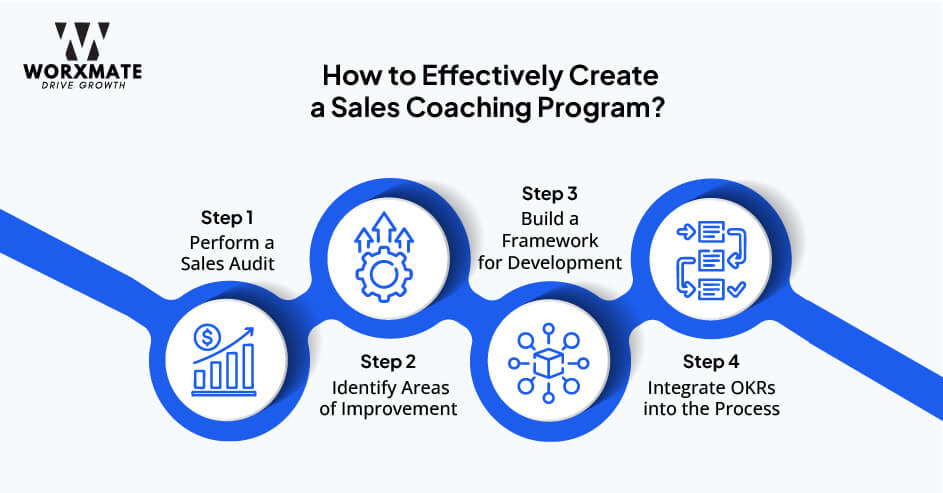- OKRs
How B2B Sales Leaders Elevate Team Performance Through Critical Sales Coaching.
- October 21, 2024
- 6 min read

When was the last time you coached your sales team instead of just managing it? If your answer involves talking quotas or reviewing performance numbers, then you’re missing the most powerful lever for growth.
Management ensures tasks get done; coaching ensures talent grows. And when talent grows, so do sales.
Think about it—how much untapped potential is sitting in your sales team right now? Without the right guidance, even your top performers may never realize what they’re truly capable of Sales coaching is about unlocking that potential.
It is a journey that transforms your salespeople from simply chasing sales to mastering the art of selling. When combined with the OKR (Objectives and Key Results) framework, coaching becomes even more powerful by aligning individual growth with measurable outcomes.
Let’s dive deep into how sales coaching, paired with OKRs, can elevate your B2B sales game.
What is Sales Coaching? vs What it is Not?
Sales Coaching is:
- A structured, ongoing process focused on developing individual skills, refining team dynamics, and driving continuous improvement.
- A tool to improve prospecting, enhance negotiation tactics, and build stronger client relationships.
- Tailored to individuals, providing personalized feedback and actionable steps to improve performance.
Sales Coaching is Not:
- A one-off training session or generic feedback delivered quarterly.
- Merely about hitting targets—it’s about helping salespeople master their craft, not just push products.
- A micromanagement tool. It’s about empowering your team, not controlling them.
Sales Coaching in the B2B Space
Unlike B2C sales, where transactions can be quick and based on immediate needs, B2B sales involves longer sales cycles, complex decision-making processes, and intricate product offerings. Here, your salespeople need more than just product knowledge—they need advanced skills in relationship-building, negotiation, and problem-solving.
A study by the Sales Management Association shows that organizations with effective coaching see 16.7% greater annual revenue growth compared to those that don’t. More than just hitting numbers, B2B sales coaching enables your team to navigate the complexity of high stakes deals with confidence and skill.
How Sales Coaching Elevates B2B Sales Team Performance?

Sales coaching is a transformative process that improves individual skills and team dynamics. Here’s how it can elevate your team’s performance:
Enhances Individual Skill Sets
Each salesperson has different strengths and weaknesses. Some excel at prospecting, while others struggle with closing deals. Effective coaching identifies these gaps and provides tailored feedback to improve critical skills like negotiation and client relationship management. This approach turns good performers into great ones.
Builds Confidence and Motivation
Sales, especially in the B2B space, can be emotionally draining. Wins are thrilling, but losses can hit hard. Coaching helps build resilience by providing both tactical advice and emotional support, boosting confidence and motivation across the team.
Fosters Continuous Learning
B2B sales is an ever-evolving field. What worked yesterday may not work tomorrow. Coaching instills a culture of continuous learning, keeping your team updated on industry trends, new technologies, and competitive strategies. A team that is always learning is always improving.
Provides Real-Time Feedback and Course Correction
Rather than waiting for quarterly reviews, sales coaching offers real-time feedback that allows your reps to adjust their strategies on the spot. This timely feedback prevents bad habits from forming and ensures your team can adapt quickly to market changes.
Drives Long-Term Growth
Sales coaching doesn’t just yield short-term gains—it’s a long-term investment in your team’s success. By consistently improving individual skills and aligning personal growth with business goals, coaching builds a foundation for sustainable growth.
How OKRs Amplify Sales Coaching?
While these benefits are crucial, to truly unlock the full potential of sales coaching, alignment with clear, measurable objectives is essential. This is where OKRs come into play. OKRs provide a clear framework for setting specific, measurable goals. By aligning personal goals with broader company objectives, OKRs foster collaboration and accountability, helping representatives see how their personal success drives the entire business forward.
Why OKRs Work Well with Sales Coaching?

OKRs complement sales coaching by providing structure, measurability, and transparency. Here’s why they work so well together:
- Alignment: OKRs ensure that individual coaching goals are in sync with broader team and company objectives.
- Measurability: They provide clear metrics to track the impact of coaching efforts.
- Transparency: OKRs foster open communication about goals and progress.
- Adaptability: They can be adjusted as needed, allowing flexibility in your coaching approach.
When OKRs are embedded in sales coaching, every improvement is aligned with company goals, driving long-term success. Not only does this motivate your team, but it also provides concrete metrics to demonstrate the impact of coaching.
How to Effectively Create a Sales Coaching Program?

To effectively create a sales coaching program and drive real change in your team, follow these best practices:
- Perform a Sales Audit
Before you can coach effectively, you need a clear understanding of your team’s current performance. Analyze key metrics like conversion rates, pipeline velocity, and deal closure times. Identify the areas where your team is excelling and where they need improvement.
- Identify Areas of Improvement
Once you’ve audited your team’s performance, focus on the areas that need the most improvement. Is it prospecting? Closing deals? Relationship-building? Understanding these gaps will allow you to provide targeted coaching that addresses your team’s specific needs.
- Build a Framework for Development
Create a structured coaching plan for each individual. This plan should include regular one-on-one sessions, specific skill-building exercises, and clear milestones for tracking progress. A consistent, ongoing approach ensures continuous development rather than sporadic growth.
- Integrate OKRs into the Process
OKRs (Objectives and Key Results) provide a strategic framework for aligning your coaching efforts with measurable outcomes. Set clear objectives like improving the close rate by 15%, and track key results to measure progress, such as increasing the number of follow-ups or reducing the average deal cycle time.
OKR Examples
Here are some OKR examples to consider to enhance your sales coaching program:
Example 1
Objective: Reduce the sales cycle length to accelerate deal closure and improve efficiency.
Key Results:
- Reduce average sales cycle length by 15% by optimizing follow-up processes and addressing bottlenecks.
- Decrease time spent in each pipeline stage by 10% through streamlining internal workflows and enhancing customer engagement.
- Implement a deal acceleration strategy that achieves 90% CRM update completion at the end of each sales cycle for better forecasting and tracking.
Example 2
Objective: Increase conversion rates at key stages of the sales funnel to boost overall sales performance.
Key Results:
- Improve lead-to-opportunity conversion rate by 20% by refining lead qualification and targeting strategies.
- Increase demo-to-proposal conversion rate to 75% by enhancing demo presentations and follow-up techniques.
- Raise proposal-to-closed-won conversion rate by 10% through better negotiation and proposal customization.
Example 3
Objective: Build and maintain a strong, high-quality sales pipeline to support sustainable revenue growth.
Key Results:
- Increase the number of qualified opportunities in the pipeline by 25% through improved prospecting and lead generation initiatives.
- Achieve a 20% increase in multi-touch sales engagements per prospect to enhance prospect nurturing and pipeline movement.
- Grow average deal size by 15% through targeted upselling and cross-selling strategies, and by identifying higher-value opportunities.
Conclusion
Sales coaching is no longer a “nice to have” for B2B sales teams; it’s a critical investment in the long-term success of your team. By enhancing individual skills, fostering collaboration, aligning personal goals with company objectives, and driving accountability, coaching can elevate your team from merely good to exceptional.
When combined with a goal-setting framework like OKRs, the impact is magnified, as coaching efforts become aligned with measurable, strategic outcomes that drive sustainable growth.
If you’re ready to elevate your sales team’s performance, adopting the right tools is key. Worxmate.ai integrates OKRs seamlessly into your sales coaching process, helping you track progress, set clear objectives, and foster a culture of accountability.
Book a call with us to elevate your sales team’s performance today.
Share this article:
